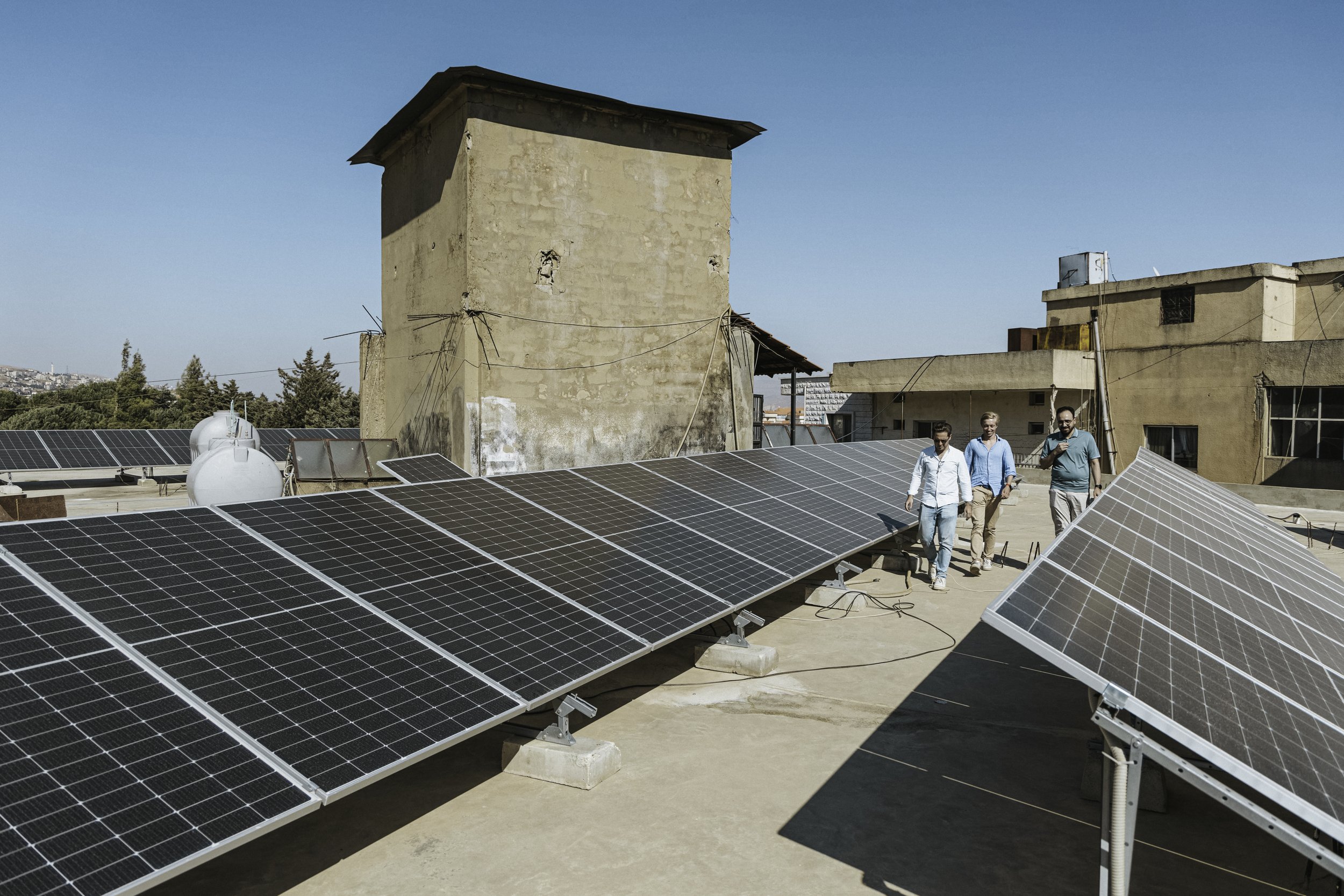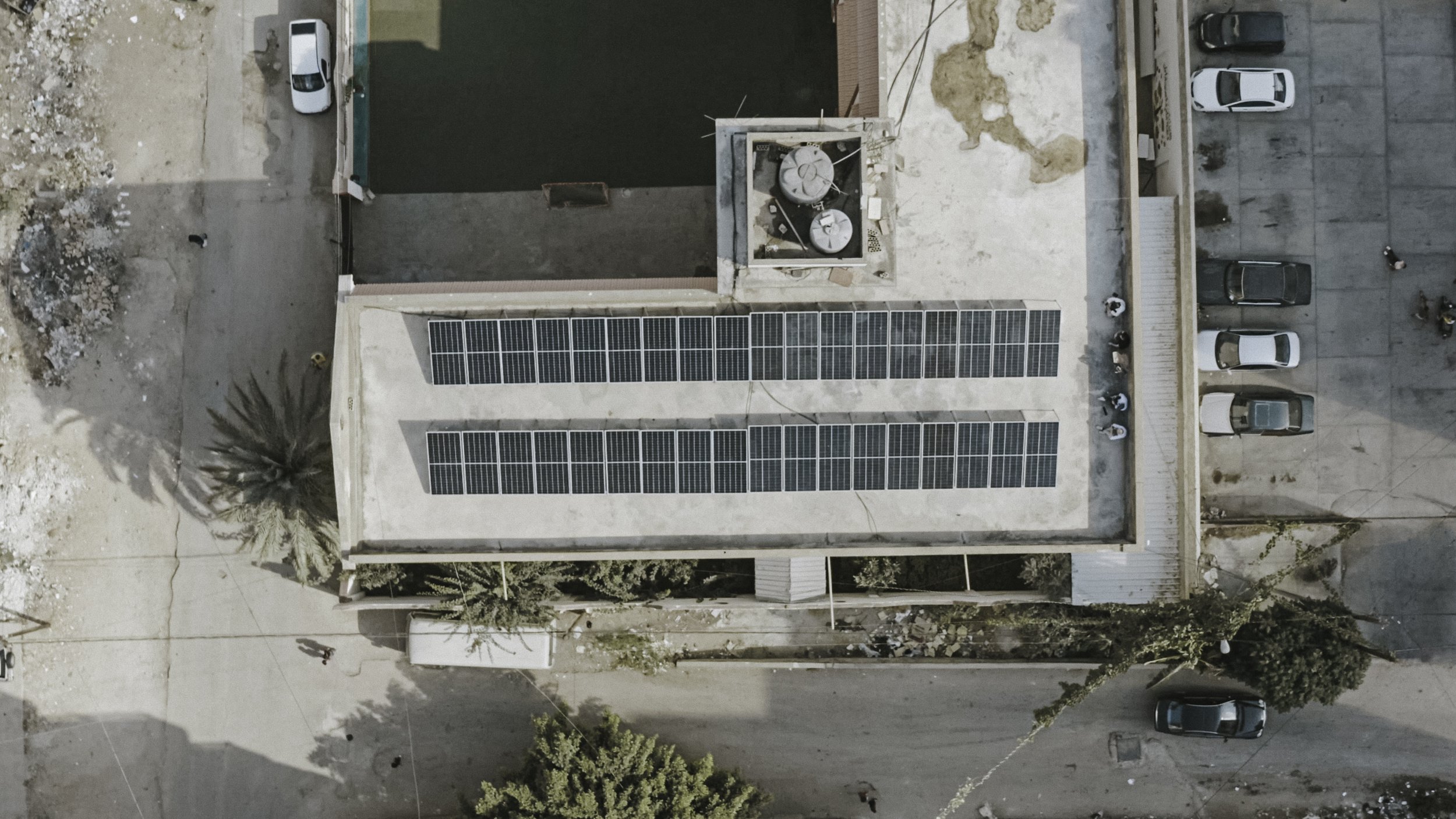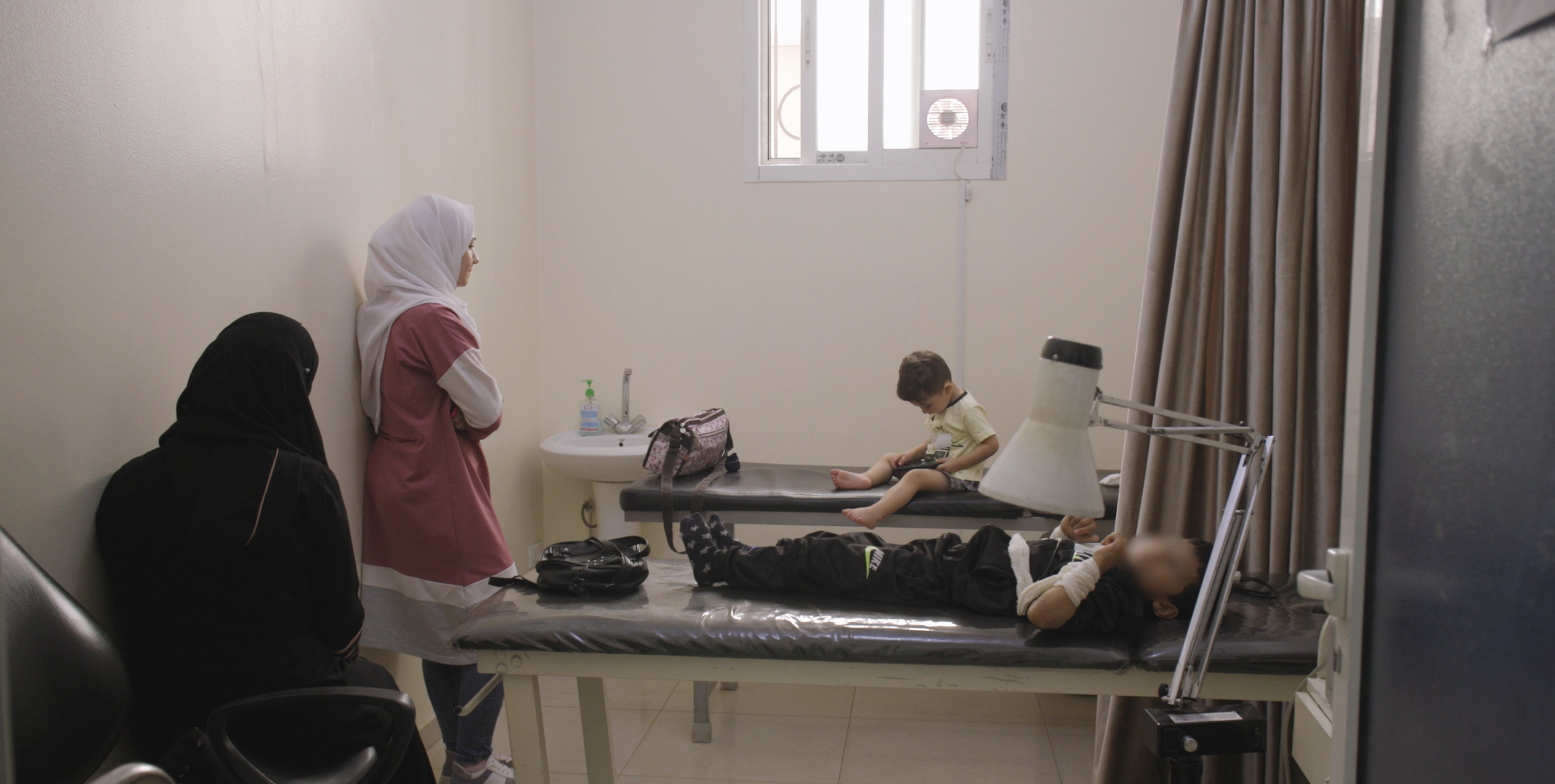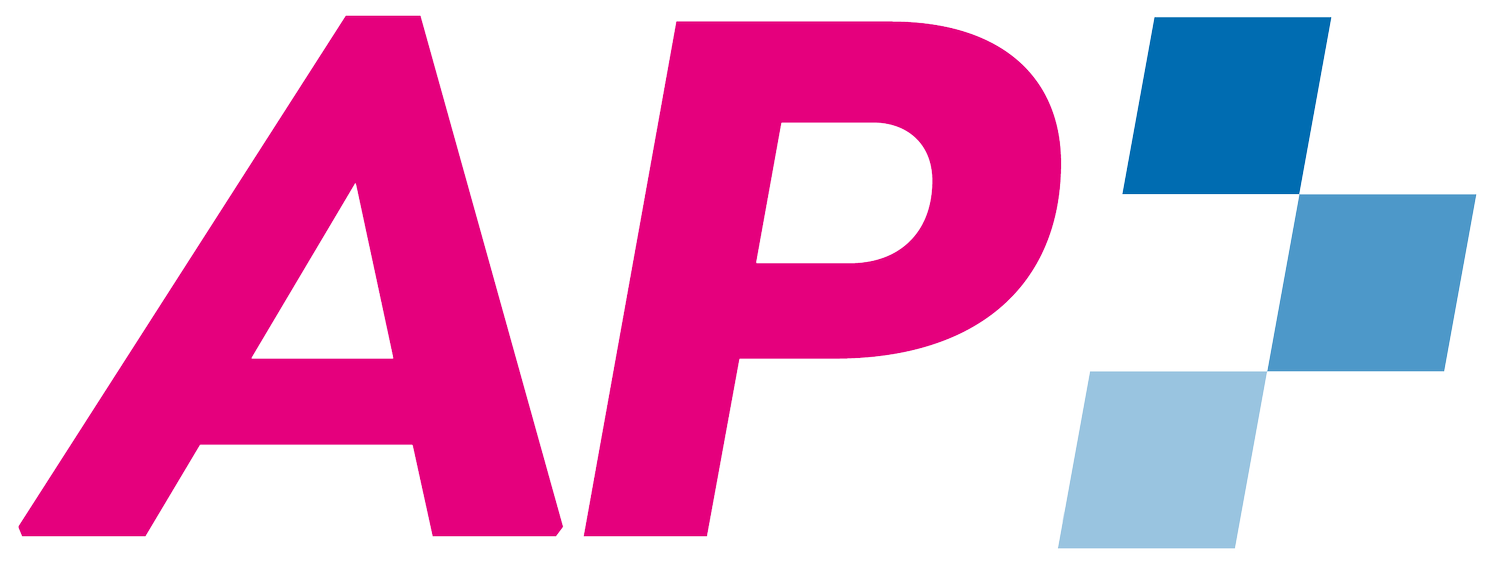
Lebanon
Aid Pioneers’ Managing Directors viewing solar systems in Lebanon.
Why does Lebanon need our support?
-
The total breakdown of the public electricity grid has thrust the nation into an energy crisis, leaving many essential service providers and facilities without reliable access to energy. To compensate for the public grid only supplying approximately two hours of energy per day, many rely on private diesel generators, which come with their own set of challenges, including environmental and health concerns, as well as increasing fuel prices.
-
The country has the highest per capita refugee population in the world, with the Bekaa region hosting the highest concentration of refugees. The government estimates there are 1.5 million Syrian refugees in Lebanon, and a staggering 90% of them are living in extreme poverty.
-
The healthcare system in Lebanon is overwhelmed and exhausted, struggling to provide even basic services for those in need.
Hospitals are facing dire shortages of medications and medical supplies, and frequent electricity cuts have forced some to close their doors entirely, leading people in need of medical care without anywhere to turn.
-
Access to education is hanging in the balance for vulnerable communities all over Lebanon.
The country hosts over half a million registered school-aged Syrian refugee children and youth. Startlingly, 30% of school-aged refugee children have never attended school, while only 11% of youth aged 15 to 24 are enrolled in education. Refugee children in Lebanon face significant barriers to accessing education and are dependent on schools outside the public school system. These schools are increasingly unable to cover running costs, including fuel and teaching materials, jeopardizing their ability to stay open.
Since the fall of 2019, Lebanon has experienced a series of crises that have left the country teetering on the brink of collapse. In 2022 Lebanon’s annual inflation rate was 171.2%, making it one of the most severe economic crises in the world since the mid-19th century. More than 80% of the population now lives below the poverty line due to the economic crisis and political unrest, leaving them in desperate need of affordable healthcare and education.
Tuyoor Al Amal School Tripoli, Lebanon.
Why it matters
3.7M
people are currently estimated to be in need of humanitarian assistance. This includes individuals across all population groups who are struggling to access essential services such as healthcare, education, shelter, food, and clean water.
140+
hospitals and health centers are damaged or disrupted. Operations are limited, primary health centers and dispensaries have closed, and many facilities struggle to maintain services due to power cuts and fuel shortages.
2 hrs/day
is the average hours of electricity that Lebanese people have daily access to - a result of extreme energy poverty due to the damaged infrastructure, fuel shortages, and economic crisis.
(Source)
How we are making an impact
At Aid Pioneers, we work hand-in-hand with trusted local partners to keep essential services running - efficiently and affordably. Lebanon was where it all began. In the aftermath of the Beirut port explosion in 2020, a group of young people mobilized with urgency and purpose. Amid a world shut down by COVID-19, we spotted a unique opportunity: empty planes still flying for cargo or logistical reasons. We quickly moved to fill them with critical medical supplies for Beirut’s overwhelmed hospitals.
Today, our support in Lebanon builds on both our core focus areas, healthcare and clean energy, by:
Supplying free essential medical supplies to improve access to care
Installing solar energy systems to ensure reliable power for critical services and reduce CO2 emissions
A powerful example of this synergy came in 2024, when we delivered a 40-foot container of medical equipment to outfit an ophthalmology unit for our partner, Al Manhaj, in Tripoli, an organization serving primarily refugee populations. At the same time, Al Manhaj became the first facility in Lebanon to receive both medical supplies and one of our solar energy systems. It marked a milestone in our integrated approach, showing how the combination of critical infrastructure and clean energy can unlock new levels of resilience for vulnerable communities. Our efforts are designed to relieve financial pressure in both the short and long term. Medical shipments bring immediate cost savings for hospitals and clinics, enabling them to lower or stabilize patient fees.
Meanwhile, solar installations create a path to energy independence - cutting diesel reliance, reducing emissions, and generating significant annual savings that institutions can reinvest into care or education. By equipping schools and health clinics with solar energy systems and delivering tailored medical supplies, we ensure that critical services continue uninterrupted, despite power cuts, rising fuel costs, or ongoing economic instability, while also building long-term resilience across communities.
Aid Pioneers Team meeting with Lebanese students.
Our Impact in Numbers
$745,213
GIK value of medical supplies sent to healthcare facilities.
2,400 t
of CO₂ emissions reduced over the next 10 years.
213 kWp
installed capacity across 8 solar systems we built.
HIGHLIGHT
Our Largest Solar System in Lebanon
At the start of 2025, we announced the finalization of our most ambitious solar project yet - marking a major milestone in our work in Lebanon.
Built in collaboration with Enpal and Apotheker ohne Grenzen, the system now powers two health clinics run by Multi Aid Programs (MAPs) in the Bekaa Valley, a region home to thousands of refugees and underserved communities.
The impact speaks for itself:
€3,000 saved every month in fuel costs
7,200 additional patient treatments enabled annually
52 tons of CO₂ emissions eliminated
This project is a powerful example of what’s possible when smart infrastructure meets local commitment. It’s not just about powering buildings - it’s about expanding access to care, reducing environmental impact, and creating a brighter, more stable future for some of Lebanon’s most vulnerable populations.
“This solar installation is more than just a project - it’s a lifeline for our clinics and the communities we serve. Every dollar saved means more lives we can touch, more patients we can heal, and more hope we can offer. “ - Mohammad Meibar Program Manager, Multi Aid Programs (MAPs)
Photo by Multi Aid Programs (MAPs).
See how we bring solar solutions to Lebanese hospitals and schools
Our Partners
Tuyoor Al Amal School, founded in 2013 by Mustafa Al-Haj, addresses the need for quality education in Tripoli, Lebanon. Starting with around 350 children, they now educate around 3000 students, many of which are Syrian refugees. The school offers officially recognized degrees and integrates life skills into the curriculum.
Since 2013, Multi Aid Programs (MAPs) serves marginalized communities in Bekaa and Arsal. They provide health, relief, education, and continuing education services to Syrian refugees, vulnerable Lebanese, and Palestinians. MAPs emphasizes community engagement and capacity-building.
Founded in 2015 and headquartered in Tripoli, Lebanon, Al Manhaj is a non-profit organization benefiting both Lebanese locals and Syrian refugees. The association has established vital medical facilities serving underprivileged areas. In the field of education, they have founded several schools, ensuring access to basic education for children. Additionally, Al Manhaj has set up Al-Fayhaa Village for Specialized Humanitarian Care, providing support, particularly to children with disabilities.







What can you do to help?
Aid Pioneers’ on-the-ground partners give Lebanon’s most vulnerable communities access to healthcare and education. As diesel prices continue to rise, our Lebanese partners are forced to either raise fees or curtail operations, with some facing the looming threat of complete closure.
With your support, Aid Pioneers can intervene through medical shipments creating immediate cost savings and solar installations granting long-term energy independence.
Partner with Aid Pioneers
At Aid Pioneers, we believe in the power of collaboration to drive meaningful impact. We’re always looking to connect with organizations, companies, and individuals who share our mission of delivering innovative, sustainable aid solutions. If you're interested in partnering with us, we’d love to hear from you. Reach out today and let’s explore how we can make a difference together.







